Maud Green
Maud Green, Lady Parr (6 April 1490/92 – 1 December 1531)[1] was an English courtier. She was the mother of Catherine Parr, the sixth wife of King Henry VIII of England. She was a close friend and lady-in-waiting to Catherine of Aragon. She was also co-heiress to her father, Sir Thomas Green of Green's Norton in Northamptonshire along with her sister, Anne, Lady Vaux.
Maud, Lady Parr | |
|---|---|
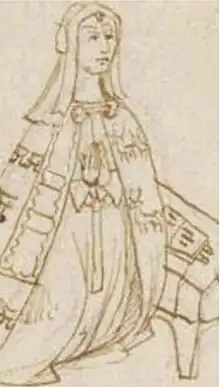 Close-up of Maud in a sketch of the Parr tomb at St. Anne's, Blackfriars Church. | |
| Born | 6 April 1490/92 Northamptonshire, England |
| Died | 1 December 1531 (aged 39) |
| Buried | Blackfriars Church, London, England |
| Noble family |
|
| Spouse(s) | Sir Thomas Parr |
| Issue | Catherine, Queen of England and Ireland William Parr, 1st Marquess of Northampton Anne Parr, Countess of Pembroke |
| Father | Sir Thomas Green |
| Mother | Joan Fogge |
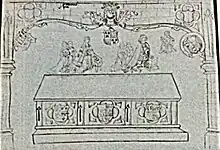
Life
Maud was born on 6 April 1490[2][3] or, 1492 in Northamptonshire, the daughter of Sir Thomas Green, of Boughton and Green's Norton,[4] and Joan Fogge, daughter of Sir John Fogge.[5]
Her mother died when she was an infant. She became a lady-in-waiting to Catherine of Aragon, the first wife of King Henry VIII sometime after 11 June 1509. She was in constant attendance upon the Queen and was allocated her own rooms at Court on a permanent basis.[6] It is thought that Maud may have named her daughter Catherine after Catherine of Aragon, who was also made godmother to the child.
Education
Maud was a very intelligent and well-educated woman; she was also fluent in French and was lauded as an excellent teacher by her peers.[7]
Marriage
Maud had married Sir Thomas Parr, the eldest son of Sir William Parr and Elizabeth FitzHugh, in 1508. He was the Sheriff of Northamptonshire, master of the wards and comptroller to the King. Maud and Thomas had three surviving children. Although Thomas Parr inherited properties in the north including Kendal Castle in Westmorland, the Parr's resided at Parr House which was located on The Strand in London. By the time Sir Thomas had inherited the castle, it was in need of repair and eventually became derelict. Parr and his wife were courtiers and stayed close to court. Thomas Parr died of the sweating sickness on 11 November 1517, leaving Maud a widow. She chose not to remarry for fear of jeopardizing the huge inheritance she held in trust for her children.[6] She carefully supervised the education of her children and studiously arranged their marriages.[8]
Issue
Before the birth of Catherine, Maud gave birth to a son shortly after her marriage to Sir Thomas. The happiness was short lived as the baby quickly died and his name was never known. After the birth of their third child, Anne, Maud again became pregnant c. 1517, the same year of Thomas' death. However, there is no subsequent mention of the child, so it was probably lost through a miscarriage, stillbirth, or death in early infancy.[9]
Surviving children of Maud Green:
- Catherine Parr (1512 – 5 September 1548) who married four times:
- Sir Edward Burgh, 1529 at Gainsborough, Lincolnshire, England.[9]
- John Neville, 3rd Baron Latimer, summer 1534 in London, Middlesex, England.[9]
- King Henry VIII, 12 July 1543 at Hampton Court Palace in the Queen's Privy closet.[10]
- Thomas Seymour, 1st Baron Seymour of Sudeley, late Spring 1547 and had one daughter: Lady Mary.
- William Parr, 1st Marquess of Northampton, 1st Earl of Essex (1513 – 28 October 1571), married three times, but produced no issue:
- Anne Parr, Countess of Pembroke (15 June 1515 – 20 February 1552), married in 1538, William Herbert, 1st Earl of Pembroke,[11] by whom she had two sons and a daughter: Henry Herbert, 2nd Earl of Pembroke (c. 1539–1601), Sir Edward Herbert (1547–1595), and Lady Anne Herbert (1550–1592).
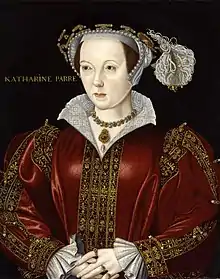 Queen Catherine Parr, sixth wife of Henry VIII
Queen Catherine Parr, sixth wife of Henry VIII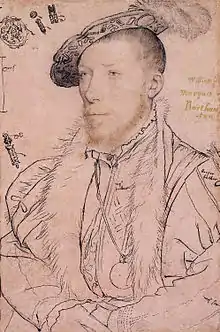
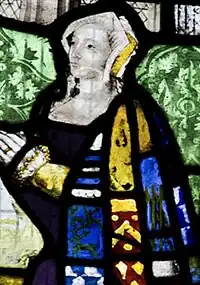
Ancestry
| Ancestors of Maud Green | |||||||||||||||||||||||||||||||||||||||||||||||||||||||||||||||||||||||||||||||||||||||||||||||||||||||||||||||||||||||||||||||||||||||||||||||||||||||||||||||||||||||||||||||||||||||||||||||||||||||||||||||||||||||||||||||||||||||||||||||||||||||||||||||||||||||||||||||||||||||||||||||||||||||||||||||||||||||||||||||||||||||||||||||||||||||||||||||||||||||||||||||||||||||||||||||||||||||||||||||||||||||||||||||||||||||||||||||||||||||||||||||||||||||||||||||||||
|---|---|---|---|---|---|---|---|---|---|---|---|---|---|---|---|---|---|---|---|---|---|---|---|---|---|---|---|---|---|---|---|---|---|---|---|---|---|---|---|---|---|---|---|---|---|---|---|---|---|---|---|---|---|---|---|---|---|---|---|---|---|---|---|---|---|---|---|---|---|---|---|---|---|---|---|---|---|---|---|---|---|---|---|---|---|---|---|---|---|---|---|---|---|---|---|---|---|---|---|---|---|---|---|---|---|---|---|---|---|---|---|---|---|---|---|---|---|---|---|---|---|---|---|---|---|---|---|---|---|---|---|---|---|---|---|---|---|---|---|---|---|---|---|---|---|---|---|---|---|---|---|---|---|---|---|---|---|---|---|---|---|---|---|---|---|---|---|---|---|---|---|---|---|---|---|---|---|---|---|---|---|---|---|---|---|---|---|---|---|---|---|---|---|---|---|---|---|---|---|---|---|---|---|---|---|---|---|---|---|---|---|---|---|---|---|---|---|---|---|---|---|---|---|---|---|---|---|---|---|---|---|---|---|---|---|---|---|---|---|---|---|---|---|---|---|---|---|---|---|---|---|---|---|---|---|---|---|---|---|---|---|---|---|---|---|---|---|---|---|---|---|---|---|---|---|---|---|---|---|---|---|---|---|---|---|---|---|---|---|---|---|---|---|---|---|---|---|---|---|---|---|---|---|---|---|---|---|---|---|---|---|---|---|---|---|---|---|---|---|---|---|---|---|---|---|---|---|---|---|---|---|---|---|---|---|---|---|---|---|---|---|---|---|---|---|---|---|---|---|---|---|---|---|---|---|---|---|---|---|---|---|---|---|---|---|---|---|---|---|---|---|---|---|---|---|---|---|---|---|---|---|---|---|---|---|---|---|---|---|---|---|---|---|---|---|---|---|---|---|---|---|---|---|---|---|---|---|---|---|---|---|---|---|---|---|---|---|---|---|---|---|---|---|---|---|---|---|---|---|---|---|---|---|---|---|---|---|---|---|---|---|---|---|---|---|---|---|---|---|---|---|---|---|---|---|---|---|---|---|---|---|---|---|---|---|---|---|
| |||||||||||||||||||||||||||||||||||||||||||||||||||||||||||||||||||||||||||||||||||||||||||||||||||||||||||||||||||||||||||||||||||||||||||||||||||||||||||||||||||||||||||||||||||||||||||||||||||||||||||||||||||||||||||||||||||||||||||||||||||||||||||||||||||||||||||||||||||||||||||||||||||||||||||||||||||||||||||||||||||||||||||||||||||||||||||||||||||||||||||||||||||||||||||||||||||||||||||||||||||||||||||||||||||||||||||||||||||||||||||||||||||||||||||||||||||
Death
Maud died on 1 December 1531 and is buried in St. Ann's Church, Blackfriars Church, London, England beside her husband.[17] In her will, she left her daughter Catherine a jeweled cipher pendant in the shape of an 'M'.[18]
Notes
- Mike Ashley "British Kings and Queens", New York; Carroll and Graf Publishing Inc., 1998.
- Anthony Martienssen "Queen Katherine Parr", McGraw-Hill Book Company, 1973. pg 7, 17, 18, 29–39.
References
- James, Susan. "Catherine Parr: Henry VIII's Last Love". 2009. Pg 14.
- https://www.thekingealogy.com/tng/getperson.php?personID=I44169&tree=tree1#cite2
- http://www.stanwardine.com/cgi-bin/tree.pl?report=detail&indi=stanwardine@I4310@
- Anthony Martienssen "Queen Katherine Parr", page 17
- Douglas Richardson. Magna Carta Ancestry: A Study in Colonial and Medieval Families, 2nd Edition, 2011. pp. 290.
- Martienssen, page18
- Martienssen, page 7.
- Martienssen, pages 29-39
- Linda Porter. Katherine, the Queen: The Remarkable Life of Katherine Parr, the Last Wife of Henry VIII. Macmillan. 2010.
- James, Susan E. Catherine Parr: Henry VIII's Last Love, Gloucestershire, England: The History Press, 2009. pg 94.
- Anne Parr, Lady Herbert Peerage.com entry of Anne Parr, Lady Herbert.
- Douglas Richardson, Plantagenet Ancestry: A Study In Colonial And Medieval Families (Royal Ancestry). Genealogical Publishing Company (June 30, 2004).
- Paget, Gerald. The Lineage and Ancestry of H.R.H. Prince Charles, Prince of Wales- Vol. I. p. 95.
- Douglas Richardson. Plantagenet Ancestry: A Study In Colonial And Medieval Families, 2nd Edition, 2011. pp. 154-55.
- Douglas Richardson. Magna Carta Ancestry: A Study in Colonial and Medieval Families, 2nd Edition, 2011. pp. 290
- Burke's Peerage. 1938. p. 2416.
- James, page 17.
- Susan E. James, Women's Voices in Tudor Wills (Ashgate, 2015), p. 86.